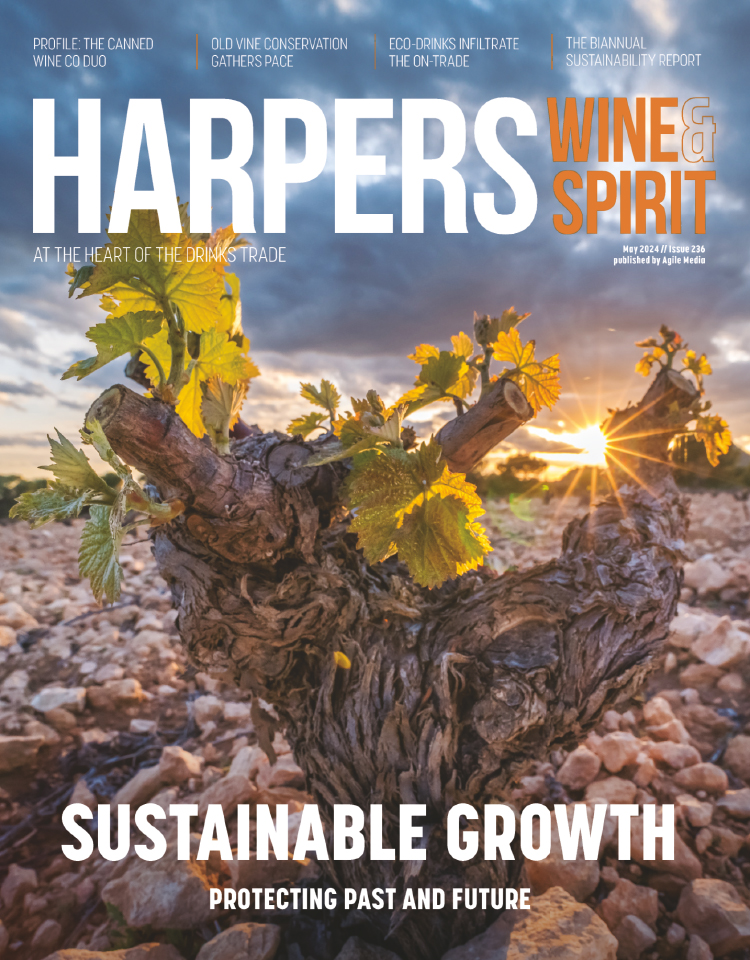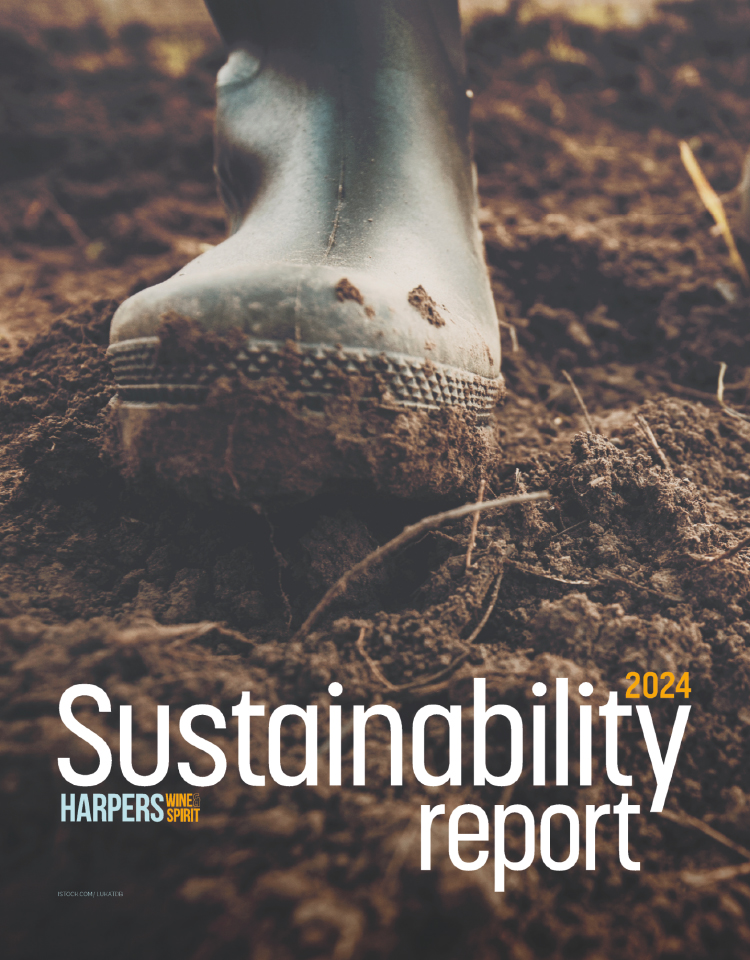Mason flavour
Chris Mason has been a man of the drinks world for more than 30 years. When he eventually decides to quit the booze-selling game, he will be drawing pensions from Pernod Ricard, Allied Domecq and Bacardi. Had it been the type of company that thought about pensions', he could have added Seagram to the list. As he says, It's only Diageo that's missing for a full set.'
As so often in the drinks trade, it very nearly didn't work out that way. Had it not been for the antisocial hours, Mason could well be appearing in the pages of Property Week or The Builder, rather than Harpers. It was rugby that saved him from the social-pariah status of his first proper job as an estate agent. I played a lot in those days,' Mason says, and, though I wasn't afraid of working long hours, I didn't want to work on Saturday afternoons. But you can't be an estate agent without working on Saturday afternoons.'
Not that Mason was especially attached to estate agency. It was pretty shocking really. I started as a negotiator, and with no training whatsoever I was making judgments on the value of people's houses. I just followed what the precedent was, so if this house was roughly the same in this area, then this was the price. Basic stuff. But I was lucky. I didn't make any big mistakes.'
Before long, a teammate of the prop forward pointed him in a more promising direction. A guy in recruitment at the rugby club told me, "You look like you display the kind of basic competence that we are looking for, and I know someone who knows someone who is looking for someone at Seagram." So I started from there. I'd always been interested in wines and spirits, but from the other side, if you know what I mean.'
As much as Mason may have enjoyed a drink in the rugby clubhouse, though, you get the impression that it was the prospect of selling that really got him motivated. I'd always worked in the holidays in places where there was transactional business.
And I worked for three years in a soft-drinks business, and some of that was van selling, and I'd always liked the feeling of making a sale. But I didn't twig at that stage all the elements that go around it. You know, the financial criteria that you have, the marketing expertise that you require and the consumer input that you need for understanding branding opportunities. I liked the feeling of success in making a sale. It's really motivational. It's a buzz.'
If there's one thing that estate agency did help him with it was in developing the skills so essential in a salesperson. Sales is a very tough environment, and the worst thing is getting
over the embarrassment of telling people you want to sell them something.
I think I got over that quite quickly. If you're confident and have the basic tools, it's only communication really. Many service industries have high-pressure sales techniques, but for me it's about relationships and getting close to people. Never being too pushy, and then, if you're doing it right, you become part of their business, too.'
Turnaround man
The drinks trade of the early '70s wasn't necessarily the best place to learn about selling, however. I wouldn't say it was unprofessional, but it was professional in a different way from how it is today,' says Mason of the period. It didn't consider that the blue-chip or FMCG sales and marketing techniques were totally appropriate. There was very much a wine-driven trade, which sold mainly into the specialists, the on-trade et cetera. They called the shots - the Allieds, Whitbreads and Lyons of this world. So I guess there was a professionalism built on the size and scope of the business rather than the techniques. The supermarkets were non-existent then. There were pundits who thought the supermarkets would never make inroads into the drinks markets. Now look at them: 66% of the market. And the Diageos and the Pernod Ricards: their expertise [today] matches that of your Proctor & Gambles and your Unilevers, which it didn't 30 years ago. It's an amazing turnaround.'
A turnaround that Mason has had a not-inconsiderable role in bringing about. After leaving the drinks trade for a couple of years to sell Weetabix to the supermarkets, he returned to the drinks trade with Seagrams at the end of the '70s and spent the '80s and '90s working his way through a series of increasingly fancy job titles' at Allied and then Pernod Ricard. His proudest achievement during that time was, he says, the reinvention' of Tia Maria, which had been all about this old couple, Gert and Daisy, the classic cringe-worthy ad campaign. We made it sexy, even though everyone thought we wouldn't be able to, and we took it from 100,000 cases to 200,000 in under five years. That was a watershed in terms of turning around an old tired brand.'
At the end of the '90s, Mason's career reached a crossroads. As head of Pernod Ricard's World Brands division, he was in charge of what is now known as travel retail. But the end of duty free in Europe made the position, if not exactly redundant, certainly considerably less important than it had been. It was quite a significant blow for World Brands,' he says. I said to Pernod Ricard that I'd be happy to take the business forward, but the overheads were probably too high for the returns we were getting.' In short, it was time to get out. As Mason puts it: In one's career it's worth trying to second-guess where a business might go and ask, "Am I in a vulnerable position?"'
Fortunately, in two months, a call came from First Drinks Brands, the UK sales and marketing company set up by Bacardi and William Grant & Sons, offering Mason the MD position. It was a non-PLC distribution company that knew exactly what it was but was there to develop the shareholder brands and seek supporting brands from third parties,' he says. I thought it had something really good in the marketplace.'
Developing this something' has been Mason's occupation for the past six years, and in a world now dominated by the big two of Pernod Ricard and Diageo, the company that Mason describes as small to medium' has been doing rather well. According to Mason, the company's most impressive performers are Glenfiddich, which has just regained the UK number-one malt slot from Glenmorangie (with an average per-litre price 61p higher' than the LVMH-owned rival); Balvenie, which is growing faster, percentage-wise, than Glenfiddich'; Mateus, which has been rejuvenated since First Drinks took it on, adding its first range extension; Disaronno, which has doubled its sales in the past couple of years; and Amarula Cream, which is showing double-digit growth in a Bailey's-dominated category. As for new brands to watch, Mason highlights Grants' vatted malt, Monkey Shoulder, which is aimed at younger male drinkers and is really trying to bring some value back to blended whisky - we won't be knocking money off', and the Icelandic premium vodka Reyka, which was brought in to replace Stolichnaya, which went to Pernod Ricard after the Allied takeover.
Mason has a wish list, too. We will only take on brands that we can "own" in the UK and that do not detract from the brands we already have,' he says. But I'd love to work with a Champagne brand. Champagne as a category fits well with our way of doing business: it's about brands.' He also quite fancies taking on another wine brand to fill the gap left by Tio Pepe, which was drafted into Gonzlez Byass's new UK office a year ago, and he says that he has had several conversations with Sogrape about taking on another of their brands, and it's been promising, but we've never pushed the button on it'. One thing is for sure: whether they come from the stables of its parent companies or from outside, there will have to be further acquisitions if Mason is to fulfil his ambitious aim to add 30% to his net sales line in the next three years.
A different game
In the meantime, while Mason, like most of the drinks industry, has his concerns over both the supermarket-led discount culture and the looming threat of Government regulation of the drinks industry in a climate of concern over binge drinking, he seems pleased with progress in his empire on the docks in Southampton. People like working here,' he says. Like most sales and marketing businesses we get turnover of staff, but whereas the average, according to the Institute of Directors, is about 20% a year, we get about 10%. We don't have any pretence here. We're not Diageo. We can't compete with either them or Pernod Ricard on their own terms - they're playing a different game. But if we stick to our strengths, which are in three categories - liqueurs, whisky and vodka - then we can do some things on their level.'
Even the emergence of Pernod Ricard as a major contender for Diageo's top spot can't dent his confidence. I think that the consolidation that has been happening, which has left us with the big two, can be an opportunity for us,' he continues. Because they could well try to do too many things. When you do that, you're in danger of letting a plate fall off a stick. And when plates fall they have a habit of breaking.' Leaving Mason, with his years of experience, to do what a good prop forward should: pick up the pieces.






